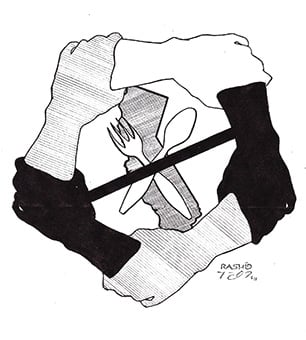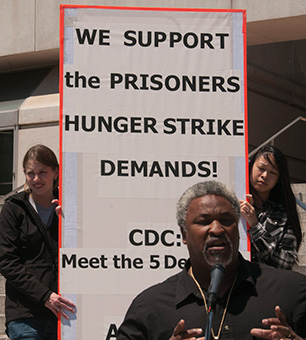Prisoners in Pelican Bay State Prison’s Security Housing Unit (SHU) are isolated for at least twenty-two and a half hours a day in cramped, concrete, windowless cells. They are denied telephone calls, contact visits, any kind of programming, adequate food and, often, medical care. Nearly 750 of these men have been held under these conditions for more than a decade, dozens for over 20 years. This treatment has inflicted profound psychological suffering and caused or exacerbated debilitating physical ailments.
Ostensibly, these men are in the SHU because they associate with gang members and isolating them is necessary to prevent gang activity and racially motivated violence. But in the summer and fall of 2011, these men, joined by other SHU prisoners throughout California, showed this claim to be the lie that it is. Organizing across racial lines, more than 6,000 SHU prisoners went on hunger strike for several weeks to protest their conditions. That’s right – men who have been isolated for over a decade and deprived of basic human rights because they are allegedly connected to racially divided gangs worked together to demand basic rights and constitutional protections for themselves and one another. Now they have resumed their hunger strike, demanding that the California Department of Corrections and Rehabilitation meet their demands.
Here is the sixth in our series of their stories and those of their families.
Paul Redd, plaintiff in the Center for Constitutional Rights lawsuit challenging long-term solitary confinement
In 1980, [I] was part of a major lawsuit to improve prison conditions. I rallied to get other prisoners involved so Folsom Prison could be added to the lawsuit. I helped to bring blacks and Mexicans together to talk, ending years of racial violence. I attempted to help black correctional officers form a black union. I provided legal assistance to all races, challenging everything from their convictions and sentences to losses of good time, lack of medical care and other matters. For that, I am called the worst of the worst.
 Drawing by Kevin “Rashid” Johnson. Johnson is currently incarcerated in Texas.When we arrived here, late, on the prison bus, pulling through the many prison gates, a guard stepped aboard to give us his speech: “This is your new home, Pelican Bay State Prison. Look to your right, left and behind you. See them trees in the hills? This will be the last time you’ll see a tree. Look at the ground. See the dirt? This will be the last time you see dirt of this earth.”
Drawing by Kevin “Rashid” Johnson. Johnson is currently incarcerated in Texas.When we arrived here, late, on the prison bus, pulling through the many prison gates, a guard stepped aboard to give us his speech: “This is your new home, Pelican Bay State Prison. Look to your right, left and behind you. See them trees in the hills? This will be the last time you’ll see a tree. Look at the ground. See the dirt? This will be the last time you see dirt of this earth.”
We walked into this building, which looks like an underground bunker but is aboveground. There are no windows to look out. There are no trees or grass anywhere in sight. There is no dirt from the earth to feel, no sun or moon to watch, no stars in the sky to count. We see no birds flying above. Only their sounds let us know they’re near. The little things in the outside world we once took for granted are now against prison rules – in here they’re called contraband.
We’re not backing down in the face of Trump’s threats.
As Donald Trump is inaugurated a second time, independent media organizations are faced with urgent mandates: Tell the truth more loudly than ever before. Do that work even as our standard modes of distribution (such as social media platforms) are being manipulated and curtailed by forces of fascist repression and ruthless capitalism. Do that work even as journalism and journalists face targeted attacks, including from the government itself. And do that work in community, never forgetting that we’re not shouting into a faceless void – we’re reaching out to real people amid a life-threatening political climate.
Our task is formidable, and it requires us to ground ourselves in our principles, remind ourselves of our utility, dig in and commit.
As a dizzying number of corporate news organizations – either through need or greed – rush to implement new ways to further monetize their content, and others acquiesce to Trump’s wishes, now is a time for movement media-makers to double down on community-first models.
At Truthout, we are reaffirming our commitments on this front: We won’t run ads or have a paywall because we believe that everyone should have access to information, and that access should exist without barriers and free of distractions from craven corporate interests. We recognize the implications for democracy when information-seekers click a link only to find the article trapped behind a paywall or buried on a page with dozens of invasive ads. The laws of capitalism dictate an unending increase in monetization, and much of the media simply follows those laws. Truthout and many of our peers are dedicating ourselves to following other paths – a commitment which feels vital in a moment when corporations are evermore overtly embedded in government.
Over 80 percent of Truthout‘s funding comes from small individual donations from our community of readers, and the remaining 20 percent comes from a handful of social justice-oriented foundations. Over a third of our total budget is supported by recurring monthly donors, many of whom give because they want to help us keep Truthout barrier-free for everyone.
You can help by giving today. Whether you can make a small monthly donation or a larger gift, Truthout only works with your support.
